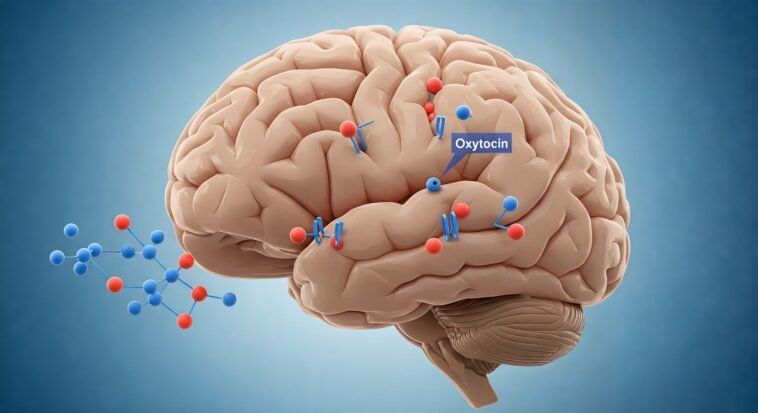
Oxytocin, also known as the “love hormone,” is the unsung hero behind our feelings of love, trust, and connection.
But it’s not just about romance—this molecule affects everything from how we interact socially to how we handle stress, and even impacts childbirth and mental health.
In this article, we’ll explore the science behind oxytocin in a way that’s easy to understand and maybe even a little fun.
Think of it like a deep dive into the chemistry of your favorite rom-com, minus the drama and with more facts.
We’ll also bust some common myths, because, let’s be real, not everything we hear about oxytocin is true.
Ready for some science with a side of pop culture? Let’s go!
What Exactly Is Oxytocin?
So, what exactly is oxytocin?
Think of it as a behind-the-scenes superhero that’s always working to keep our emotions and relationships in check.
This powerful neuropeptide and hormone is mainly produced in the hypothalamus and released by the pituitary gland, acting both as a messenger in the brain and a hormone in the bloodstream.
Oxytocin does a lot of heavy lifting, including:
- Building and strengthening emotional connections (yes, it’s the reason we get those warm fuzzies)
- Helping us navigate social situations with trust and empathy
- Playing a crucial role in childbirth and breastfeeding (pretty important stuff!)
- Calming our stress and anxiety when life gets a little too intense
Research published in Frontiers in Endocrinology (2018) shows that oxytocin is responsible for everything from nurturing behaviors like maternal care to bonding with friends and group cohesion.
So, it’s safe to say, without oxytocin, our emotional lives would be like a rom-com without any heart—still entertaining, but not quite as meaningful!
How Does Oxytocin Work?
So, how does oxytocin actually work?
Think of it like a key that unlocks special doors in our body and brain.
Oxytocin binds to receptors, which are like little locks spread across our body and brain.
When these receptors are triggered, they spark a range of emotional and physical reactions, including:
- Boosted trust and empathy (making us better at connecting with others)
- Lowered fear responses (bye-bye, anxiety!)
- A stronger drive to socialize and build relationships
- Physical effects, like triggering uterine contractions during childbirth and helping with milk release when breastfeeding
Here’s a fun twist: even small bursts of oxytocin can cause a flood of positive feelings. That’s why hugging, petting a dog, or sharing a good laugh can feel like a mini mood-boosting party for your brain. It’s like your body’s way of saying, “You’re doing great!”

The Major Benefits of Oxytocin
Oxytocin isn’t just about those “feel-good” moments—it’s got some serious benefits that can make a real impact on our lives.
Here’s how this powerful hormone is doing some heavy lifting in the body:
Strengthening relationships
Romantic bonds
Ever notice how you feel more connected to someone after a special moment?
Well, oxytocin levels spike during early romantic encounters and continue to rise as relationships deepen.
It’s like the brain’s version of a love potion, building that emotional connection over time.
Friendships
Oxytocin also works its magic in friendships, boosting trust and generosity.
It’s why you feel closer to friends when you share moments of kindness or laughter—it’s nature’s way of helping us bond.
Childbirth and maternal care
Labor
When it’s go-time for a baby to arrive, oxytocin takes center stage, triggering uterine contractions to help move things along.
It’s like the body’s own version of a director making sure the delivery goes smoothly.
Breastfeeding
This hormone also helps with milk ejection during nursing—because, yes, oxytocin is basically your body’s multitasker.
Bonding
New moms get a boost of oxytocin, which helps them emotionally bond with their newborns.
It’s like an invisible thread connecting mother and child, ensuring that emotional attachment grows strong.
Reducing Stress and Anxiety
Oxytocin isn’t just a feel-good hormone; it’s a stress-buster too.
It helps fight off cortisol (the “stress hormone”), lowering blood pressure and promoting relaxation.
Studies in Psychoneuroendocrinology have shown that oxytocin can reduce anxiety in stressful situations, making it a potential calming agent when life gets overwhelming.
Enhancing emotional health
Emerging research suggests oxytocin could be a game-changer in mental health, with potential benefits for:
- Autism Spectrum Disorders
- Social Anxiety
- PTSD (Post-Traumatic Stress Disorder)
While these studies are still in their early stages, oxytocin could one day play a role in therapeutic treatments for these conditions—think of it as the hopeful sidekick in mental health care, though more research is needed to fully understand its powers.

How to Naturally Boost Oxytocin
You don’t need a prescription to boost your oxytocin levels—there are plenty of natural, science-backed ways to get this “love hormone” flowing.
Here’s how you can make oxytocin work for you, no doctor’s note required:
Physical touch
Whether it’s hugging, cuddling, or getting a massage, physical touch is a powerful oxytocin booster.
A study published in Comprehensive Psychoneuroendocrinology (2020) found that just a 20-second hug can work wonders.
So, next time you’re feeling down, reach out for a hug—it’s like a mini happiness shot.
Positive social interactions
Spending quality time with loved ones, having deep conversations, or just laughing together can significantly raise oxytocin levels.
It’s not just about the quantity of time spent—it’s the quality. So, call up a friend for a chat, share some laughs, and feel the oxytocin magic.
Acts of kindness
Doing something kind, like giving a genuine compliment or helping someone in need, doesn’t just feel good—it boosts oxytocin, too.
It’s like a win-win for both you and the person you’re helping.
Kindness isn’t just contagious—it’s scientifically rewarding!
Meditation and mindfulness
Practices like meditation and mindfulness, especially those focused on compassion, are great for boosting oxytocin.
So, if you’re looking for some inner peace—and a little love boost—spend a few minutes each day focusing on kindness and compassion, and watch the oxytocin flow.
Pet therapy
Spending time with animals, whether it’s petting your dog, cuddling a cat, or even just watching fish swim in a tank, can increase oxytocin.
It’s like your furry friends are little oxytocin factories, helping you feel more relaxed and connected.
Pro tip: Next time you’re in need of a quick mood lift, try a 20-second hug. Research says it can significantly raise your oxytocin levels—so get hugging!

Popular Myths About Oxytocin — Debunked
Oxytocin may be a superstar hormone, but it’s often surrounded by myths.
Let’s take a moment to debunk some of the most common misunderstandings:
Myth 1: Oxytocin only relates to romantic love
Truth: While oxytocin is often linked to romantic relationships, it’s actually key in many forms of bonding.
From friendships and parent-child connections to teamwork among strangers, oxytocin helps us form emotional bonds across the board.
It’s like the social glue that holds us together, not just the heartstrings of romance.
Myth 2: Oxytocin always creates positive feelings
Truth: While oxytocin is often associated with positive emotions, it’s not always sunshine and rainbows.
In certain situations, it can boost in-group favoritism and even spark aggression toward outsiders (Current Directions in Psychological Science, 2012).
So, while it can make you feel warm and fuzzy with your inner circle, it can also make you a little territorial when it comes to “outsiders.”
It’s complicated, like that friend who’s super sweet to you but gives the side-eye to new people.
Myth 3: Oxytocin is a “Cure-All” for mental health issues
Truth: As promising as oxytocin therapy sounds, it’s not a quick fix for mental health problems.
Its effects vary greatly between people, and the long-term impacts are still being studied.
It’s like expecting a magic pill to solve everything—it’s not quite that simple.
Research is still in its early stages, so let’s keep our expectations in check.
Myth 4: Taking oxytocin supplements guarantees better relationships
Truth: Oxytocin sprays and supplements are out there, but here’s the kicker: they’re not FDA-approved for emotional benefits, and their effectiveness outside of controlled clinical settings is unproven.
So, as tempting as it may be to buy a bottle and expect instant relationship upgrades, it’s not that easy.
Think of it like those miracle skincare products—sometimes, they don’t live up to the hype.
Potential Risks and Side Effects of Oxytocin Therapy
While natural oxytocin release through social bonding is safe, artificial oxytocin administration (e.g., via nasal spray) can carry potential risks:
- Headaches
- Nausea
- Mood swings
- Possible interference with natural hormonal balance
In medical settings (like inducing labor), oxytocin use must be carefully monitored to avoid complications like uterine hyperstimulation.

Quick Summary: Oxytocin at a Glance
| Aspect | Key Takeaway |
| What It Is |
Hormone and neuropeptide linked to bonding and trust
|
| Produced By |
Hypothalamus, secreted by the pituitary gland
|
| Benefits |
Enhances bonding, reduces stress, aids childbirth
|
| Natural Boosters |
Hugging, social bonding, acts of kindness
|
| Risks |
Artificial administration has potential side effects
|
| Future Use |
Mental health therapies (under research)
|
Final Thoughts
Oxytocin isn’t just the “love hormone” for romantic moments—it’s a major player in everything from parenting to stress relief.
Understanding how it works can help us build stronger relationships, manage stress, and stay ahead of exciting new research.
So next time you hug someone, laugh, or help a friend out, remember—you’re giving yourself and others a natural happiness boost.
It’s like your brain’s own feel-good power-up, no charge required!



